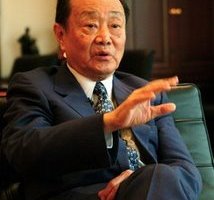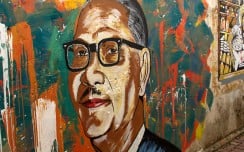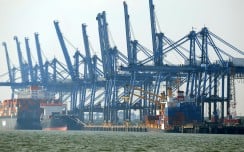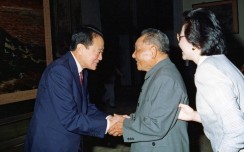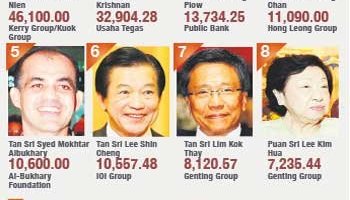Billionaire Kuok says empire can last generations
When billionaire
Robert Kuok
introduced a luxury hotel brand in 1971, he named it Shangri-La, after
the fictional utopia in which inhabitants enjoy unheard-of longevity.
Ensconced
in his executive suite 32 floors above Hong Kong’s Victoria Harbor --
the room decorated with a pair of elephant tusks gifted by the late
Tunku Abdul Rahman, the first prime minister of Malaysia -- the world’s
38th-richest person appears to have defied the aging process himself.
Kuok had accumulated a fortune of $19.4 billion as of Jan. 31, according to the
Bloomberg Billionaires Index.
Trim, dapper and straight backed at 89, he shows no signs of stopping
there, Bloomberg Markets magazine will report in its March issue
A waiter serves a customer at the bar at the Shangri-La Hotel in Paris. Photographer: Eric Piermont/AFP/Getty Images
This year, the media-shy Malaysian-born magnate will likely open his
71st sumptuously appointed Shangri-La. Six of them are scheduled to be
opened in the third quarter alone, including one perched in
the Shard, the 72-story London skyscraper that’s the tallest office building in Western Europe.
Meanwhile,
the public and private companies his family controls continue to pump
money into his ancestral homeland, China, where his investments range
from Beijing’s tallest building to cooking oil brands that have gained a
50 percent market share in the world’s most populous nation.
 Robert Kuok shovels dirt at a
ground breaking ceremony for the Shangri-La Asia Ltd.'s new hotel in
Guangzhou on Feb. 26, 2004. Through the unlisted family-owned holding
company, Kerry Group Ltd., which he chairs, Kuok controls listed
enterprises with a total market value of about $35 billion.
Photographer: Grischa Rueschendorf/Bloomberg
Robert Kuok shovels dirt at a
ground breaking ceremony for the Shangri-La Asia Ltd.'s new hotel in
Guangzhou on Feb. 26, 2004. Through the unlisted family-owned holding
company, Kerry Group Ltd., which he chairs, Kuok controls listed
enterprises with a total market value of about $35 billion.
Photographer: Grischa Rueschendorf/Bloomberg
‘Personally Powerful’
One of Kuok’s companies, Singapore-listed
Wilmar International Ltd. (WIL), is the world’s biggest processor of
palm oil and eighth-biggest sugar producer.
Wilmar International Ltd.’s
cooking oil brands —led by Jin Long Yu, meaning Golden Dragon Fish, seen
in this photo — grease half of China’s woks and generate 48 percent of
the company's revenue. Photographer: Qilai Shen/Bloomberg
 Western Europe's tallest office
building will be home to one of Robert Kuok's new luxury Shangri-La
hotels. Six are scheduled to be opened worldwide during the third
quarter. Photographer: Jumper/Getty Images
Western Europe's tallest office
building will be home to one of Robert Kuok's new luxury Shangri-La
hotels. Six are scheduled to be opened worldwide during the third
quarter. Photographer: Jumper/Getty Images
Others
operate shipping and logistics businesses, a property portfolio
stretching from Paris to Sydney and East Asia’s most influential
English-language newspaper, the Hong Kong-based
South China Morning Post.
“He’s
so vital, so active and continues to be so personally powerful,” says
Timothy Dattels, San Francisco-based senior partner at U.S. buyout firm
TPG Capital LP and a director of Kuok’s Hong Kong-listed
Shangri-La Asia (69) Ltd. “I can’t imagine a day without him at the top.”

Others
can, which is why the question of succession looms over the Kuok empire
as the patriarch prepares to mark his 90th birthday in October.
The world’s 39th-richest person,
who named his Shangri-La hotel chain after the fictional utopia in which
inhabitants enjoy unheard-of longevity, is trim, dapper and straight
backed at 89. The public and private companies his family controls
include investments in Beijing’s tallest building and cooking oil brands
that have gained a 50 percent market share in China. Photographer:
Grischa Rueschendorf/Bloomberg
Through
the unlisted family-owned holding company, Kerry Group Ltd., which he
chairs, Kuok controls listed enterprises with a total market value of
about $40 billion.
As it stands, the family enterprises are seeking to recover from a rocky 2012 that featured some sharp share-price and profit
drops.
First Interview
In his first interview with Western news
media in 16 years, Kuok, who has eight children and numerous other
relatives sprinkled through his executive ranks, says he won’t be
worried when that day eventually comes.
“Everything on earth is
dynamic,” he says in perfectly enunciated English. “I can only give my
children a message, not money. If they follow it, we can go another
three or four generations.”
Relatives run the most important of the Kuok businesses.
Kuok’s second son, Kuok Khoon Ean, 57, heads Shangri-La Asia, of which the family owns 50 percent.
A
nephew, Kuok Khoon Hong, 63, co-founded and chairs Wilmar
International, the largest Kuok-controlled company, with a market value
of almost $20 billion, in which the Kuok family controls a 32 percent
stake.
A daughter, Kuok Hui Kwong, 35, is executive director of
SCMP Group Ltd., publisher of the 109-year-old South China Morning Post,
which Kuok took control of in 1993, when he paid
Rupert Murdoch’s News Corp. $349 million for a 35 percent stake.
 Pedestrians walk past the
headquarters of the South China Morning Post in Hong Kong. Robert Kuok's
daughter, Kuok Hui Kwong, 35, is executive director of SCMP Group Ltd.,
which Robert Kuok took control of in 1993, when he paid Rupert
Murdoch’s News Corp. $349 million for a 35 percent stake. Source:
Imaginechina
Pedestrians walk past the
headquarters of the South China Morning Post in Hong Kong. Robert Kuok's
daughter, Kuok Hui Kwong, 35, is executive director of SCMP Group Ltd.,
which Robert Kuok took control of in 1993, when he paid Rupert
Murdoch’s News Corp. $349 million for a 35 percent stake. Source:
Imaginechina
Focus Attention
As to who will succeed the master, most
investors in Kuok enterprises focus attention on his eldest son, Kuok
Khoon Chen, 58, who’s known as Beau.
Robert declined to confirm that Beau, who is deputy chairman of Kerry Group, will succeed him.
 The development site for the
Shangri-La Residences stands in Yangon, Myanmar on Nov. 20, 2012.
Photographer: Dario Pignatelli/Bloomberg
The development site for the
Shangri-La Residences stands in Yangon, Myanmar on Nov. 20, 2012.
Photographer: Dario Pignatelli/Bloomberg
“Newshounds
like excitement in their stories, whereas leadership of a business
group is always a serious matter, and it would be wrong to put in
writing any kind of assumption,” Kuok wrote in an e-mail following the
interview.
 A visitor looks out the window of
Island Shangri-La hotel, owned by Shangri-La Asia Ltd., in Hong Kong.
Robert Kuok’s second son, Kuok Khoon Ean, 57, heads Shangri-La Asia, of
which the family owns 50 percent. Photographer: Marco Flagg/Bloomberg
A visitor looks out the window of
Island Shangri-La hotel, owned by Shangri-La Asia Ltd., in Hong Kong.
Robert Kuok’s second son, Kuok Khoon Ean, 57, heads Shangri-La Asia, of
which the family owns 50 percent. Photographer: Marco Flagg/Bloomberg
Beau, who’s worked in his father’s businesses since 1978, is chairman of
Kerry Properties Ltd. (683)
The firm, 55 percent owned by Kerry Group, develops luxury apartments,
shopping malls and offices mostly in China and Hong Kong.
“I know
Beau, and he has a good team,” says Peter Churchouse, founder of Hong
Kong-based property investor Portwood Capital Ltd. “But you have to
wonder whether the second and third generations have the entrepreneurial
and trading instincts that the father has.”
‘China Watcher’
The father’s instincts were honed over
decades of personal and historical turbulence inconceivable to the
generation vying to take over the family business.
That
experience helped him become one of the first -- and best-connected --
foreign investors in China following Mao Zedong’s communist revolution.

“Robert is the best China watcher in the business,” says
Simon Murray,
chairman of Glencore International Plc, the world’s biggest
commodities-trading company. “He understands the steel backbone of the
Communist Party, but while other Hong Kong tycoons tend to be hugely
subservient to Beijing, he is in no way obsequious.”
Robert Kuok, chairman of Kerry
Group Ltd., holds a trophy during the 2012 CCTV China Economic Person of
The Year award at China Central Television in Beijing on Dec. 12, 2012.
Source: ChinaFotoPress via Getty Images
For all of Kuok’s prowess, 2012 was a tumultuous year for investors in his enterprises.
While Kerry Properties stock surged 57 percent in Hong Kong last year -- more than double the increase in the
Hang Seng Index -- Wilmar International’s shares plummeted 33 percent, making it the worst performer in Singapore’s
Straits Times Index. (FSSTI)
‘A Fraction’
The
plunge wiped the equivalent of more than $8 billion from the company’s
market value -- and almost $3 billion from the family’s fortune. This
year, Wilmar’s share price has rebounded, rising 14 percent in January.
In
any event, Kuok disputes Bloomberg’s valuation of his personal wealth
at $19.4 billion; he says it’s “a fraction” of that amount, though he
does not volunteer an alternative figure.
Wilmar’s woes stem from
its massive exposure to China, where its cooking oil brands -- led by
Jin Long Yu, meaning Golden Dragon Fish -- grease half the country’s
woks and where it gets 48 percent of its revenue.
Beijing limited price increases on edible oils during most of 2011 and part of 2012, Wilmar said at the time.
Furthermore,
the rising cost of soybeans, which Wilmar uses to produce cooking oil,
hit a record $17.89 a bushel in September, squeezing earnings.
Rough Ride
In the first nine months of 2012, profit fell 29 percent to $779 million from $1.1 billion a year earlier.
Kuok’s Hong Kong-based companies have had a rough ride since the global financial crisis.
As
of Jan. 31, Shangri-La Asia and Kerry properties shares were both down
19 percent compared with a 1 percent increase in the Hang Seng Index.
Asked about such
underperformance (583), Kuok says enigmatically, “It is right and proper for the investor to like or dislike a share.”
Underperformance
isn’t the only problem at SCMP Group, whose share price had declined 69
percent as of Jan. 30 since Kuok acquired it. In 19 years, the South
China Morning Post has churned through 11 editors, including one who
served twice.
And although Kuok says his news executives publish
without fear or favor, present and former staff members have publicly
complained that the paper sometimes self-censors stories it thinks the
Chinese government wouldn’t like.
‘Toned Down’
“Under
his ownership, criticism of China has been toned down,” says David
Plott, managing editor of Global Asia, a Seoul-based quarterly. “And if
you look at the turnover of editors, it tells you one of two things:
either Robert Kuok doesn’t know what he wants or he knows what he wants
and he hasn’t gotten it.”
If that’s true, it might be a first for Kuok, whose life story has been one of single-minded achievement.
The
son of Chinese immigrants who had settled in British- controlled
Malaya, Robert Kuok Hock Nien -- his full name -- grew up speaking his
parents’ Chinese Fuzhou dialect, English and even Japanese during
Japan’s wartime occupation of the region.
Significantly, given the role China would play in Robert’s life, his
mother encouraged him to achieve fluency in Mandarin and embrace his
Chinese heritage.
Kuok’s
parents ran a shop that sold rice, sugar and flour. Kuok recalls living
with the smell of his addicted father’s opium pipe in his nostrils.
Family Business
Still,
there was enough money for Robert to progress from a local English
school to Raffles College in Singapore, where fellow students included
Lee Kuan Yew, later the founder of modern Singapore.
Kuok
never finished his studies. In 1941, Japanese troops stormed through
the Malay Peninsula and in February 1942 captured Singapore. Kuok took a
job with Mitsubishi Corp. With Japan’s defeat in 1945, his family
resumed doing business under the British.
In 1949, after his
father died, Robert; a brother, Philip; and other relatives founded Kuok
Bros. Sdn., which later specialized in sugar refining.
Philip
went on to become a Malaysian diplomat, and a second, much-admired
brother, William, took an entirely different path again by joining the
communist revolt against colonial rule. In 1953, William Kuok was killed
by British troops in a jungle ambush.
Furtive Rendezvous
Robert
Kuok, by contrast, used his English-language skills on visits to London
to learn the sugar business while remaining based in Malaysia and later
Singapore.
During the
Cold War, he traded with both Western and communist blocs, meeting Cuba’s
Fidel Castro and doing business with China’s Mao from as early as 1959.
In
1973, with China in the grip of the Cultural Revolution, Kuok was
summoned to Hong Kong for a furtive rendezvous with two of Mao’s trade
officials.
They confided that China was facing a sugar shortage.
Kuok stepped into the breach, transferring his headquarters to Hong Kong
that year.
It was a prescient move. In 1976, Mao died, and in 1978,
Deng Xiaoping tore down the so-called Bamboo Curtain, initiating reforms that sparked 34 years of surging
economic growth.
In
1984, Kuok opened his first Shangri-La on the mainland. The following
year, he partnered with China’s foreign trade ministry to begin building
the
China World Trade Center (600007) in Beijing.
Enduring Mystery
In
1988, at his nephew Khoon Hong’s suggestion, he branched out into
edible oils. By 1993, Coca-Cola Co. was impressed enough with Kuok’s
China connections to form a bottling joint venture with him.
That
lasted until 2008, when Coke bought back Kerry Group’s stake for an
undisclosed amount, both companies pronouncing the outcome a success.
The
family’s history of that period harbors an enduring mystery: a 16-year
parting of the ways between Robert and Khoon Hong, who in 1991 left the
Kuok Group to set up Wilmar with Indonesian entrepreneur Martua Sitorus.
It wasn’t until 2007 that Robert acquired a 32 percent stake in
Wilmar and injected most of his agribusiness into it. Neither Robert nor
his nephew would discuss the split.
For all his triumphs in the
capitalist world, Robert Kuok says the biggest influences on his life
were his devoutly Buddhist mother and his communist revolutionary
brother, William.
‘Good Boys’
“Otherwise, probably I
would have been an arrogant middle- class Chinese, only caring about
materialism, worldly pleasures and fleshpot pleasures,” Kuok says, his
moist eyes betraying a momentary sadness. “When I am tempted, I think of
what William went through. He sacrificed his life trying to help the
underprivileged.”
Kuok says he has tried to pass on those values
by not cocooning his children in privilege. Nor, he adds, does he place
much emphasis on scholastic qualifications, including MBA degrees, when
hiring senior staff.
Beau Kuok earned a bachelor’s degree in economics from
Monash University in Melbourne; Ean holds a similar qualification from the
University of Nottingham in England. Kuok describes Beau and Ean as “good boys.”
Among members of the extended family, Kuok speaks highly of Khoon Hong, his nephew at Wilmar.
‘Stupid Ones’- Perils of succession
“There
are stupid ones, there are mean ones, but he’s one of the cleverest,”
Robert Kuok says. None of the second- generation Kuoks would comment for
this article. Kuok says they make their own decisions. “I never control
my children,” he says. “We are a very liberal, democratic family.”
The perils of succession are acute in Kuok’s bailiwick, according to researchers at the
Chinese University of Hong Kong.
Their
study of 250 family-controlled businesses in Hong Kong, Singapore and
Taiwan from 1987 to 2005 shows that stocks typically plunged 60 percent
over an eight-year period before, during and after a founder’s
relinquishing control.
Joseph Fan, the finance professor who led
the research, attributes this wealth destruction to the inability of the
patriarch to pass on, even to family members, his most valuable,
intangible assets, including relationships with governments and banks.
“The founder is the key asset,” Fan says.
That’s why, Fan says,
so many tycoons remain at the helm of their businesses well into their
80s and don’t disclose succession plans.
Octogenarian Rivals
Last
year, following investor concerns over feuds that have split the second
generation of some of Hong Kong’s most prominent families, two of
Kuok’s octogenarian billionaire rivals in the property business,
Li Ka-shing
of Cheung Kong Holdings Ltd. and Lee Shau-kee of Henderson Land
Development Co., finally disclosed which of their progeny would
eventually take control.
TPG Capital’s Dattels says succession isn’t a concern when it comes to the Kuok businesses.
“There’s
only one Robert Kuok, there’s no doubt,” he says. “But he has instilled
his business philosophy deep into the family. With what he has built,
they are well set to continue, whatever happens.”
Back at his
Hong Kong headquarters, Kuok asks an assistant to bring him a favorite
quotation. Written by his mother in Chinese and engraved on a steel
plate, the aphorism reads:
“If my children and grandchildren can
be like me, then they don’t require material inheritance. But if they
are not like me, then of what use is my wealth to them?”
Those
words beg the question investors in Kuok’s far-flung businesses are
asking now more than ever: How like Robert Kuok are his heirs? - Bloomberg













